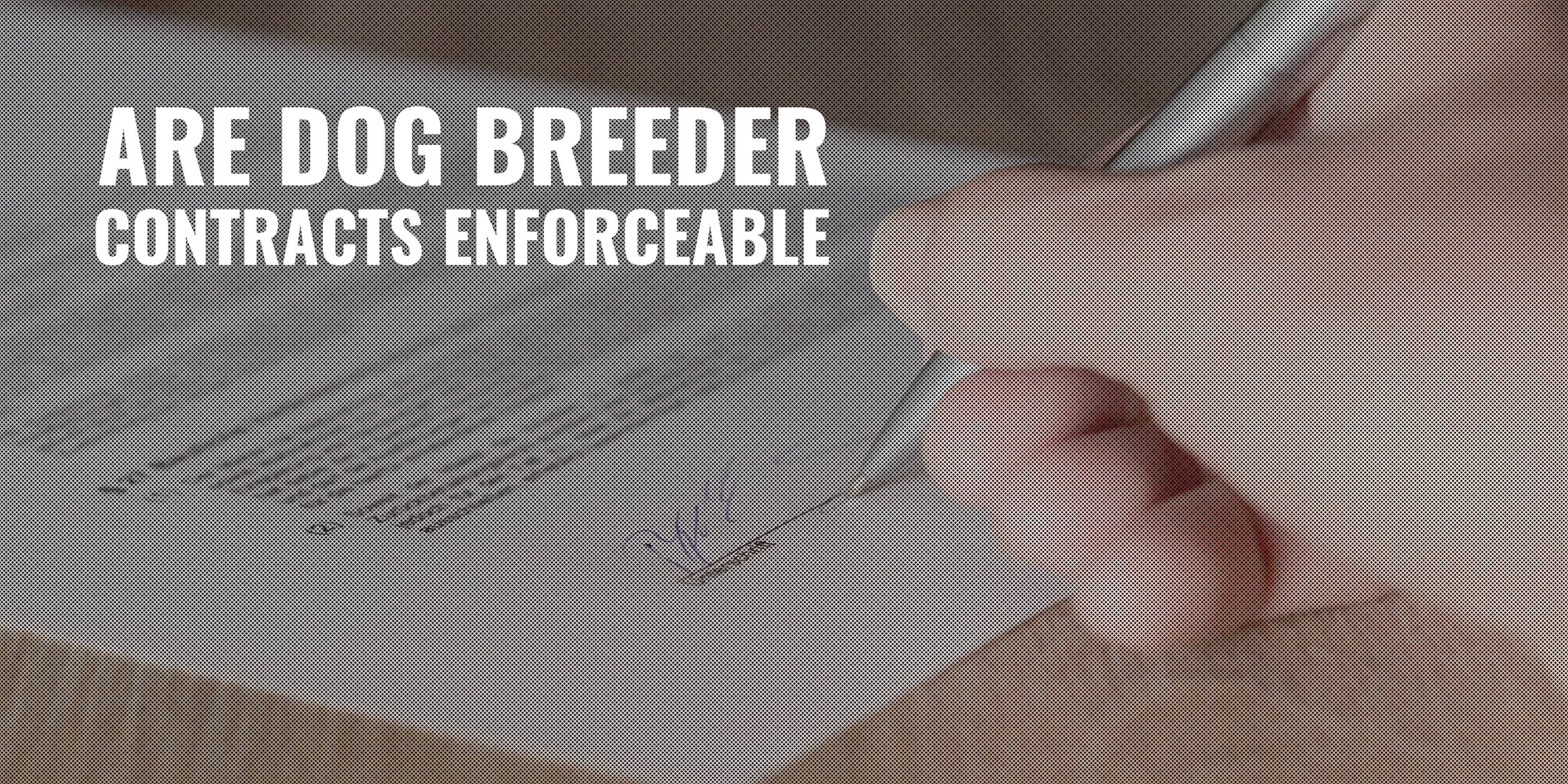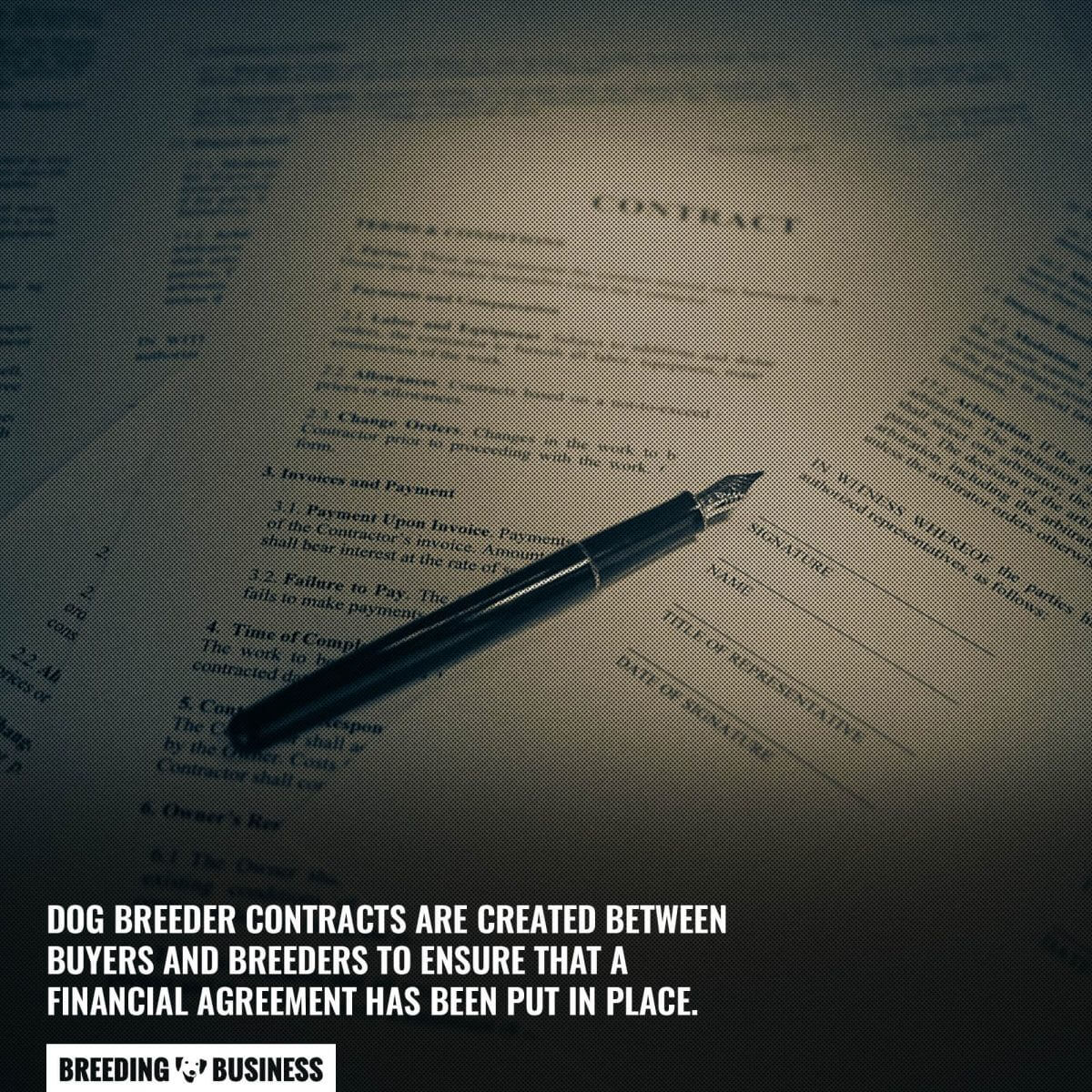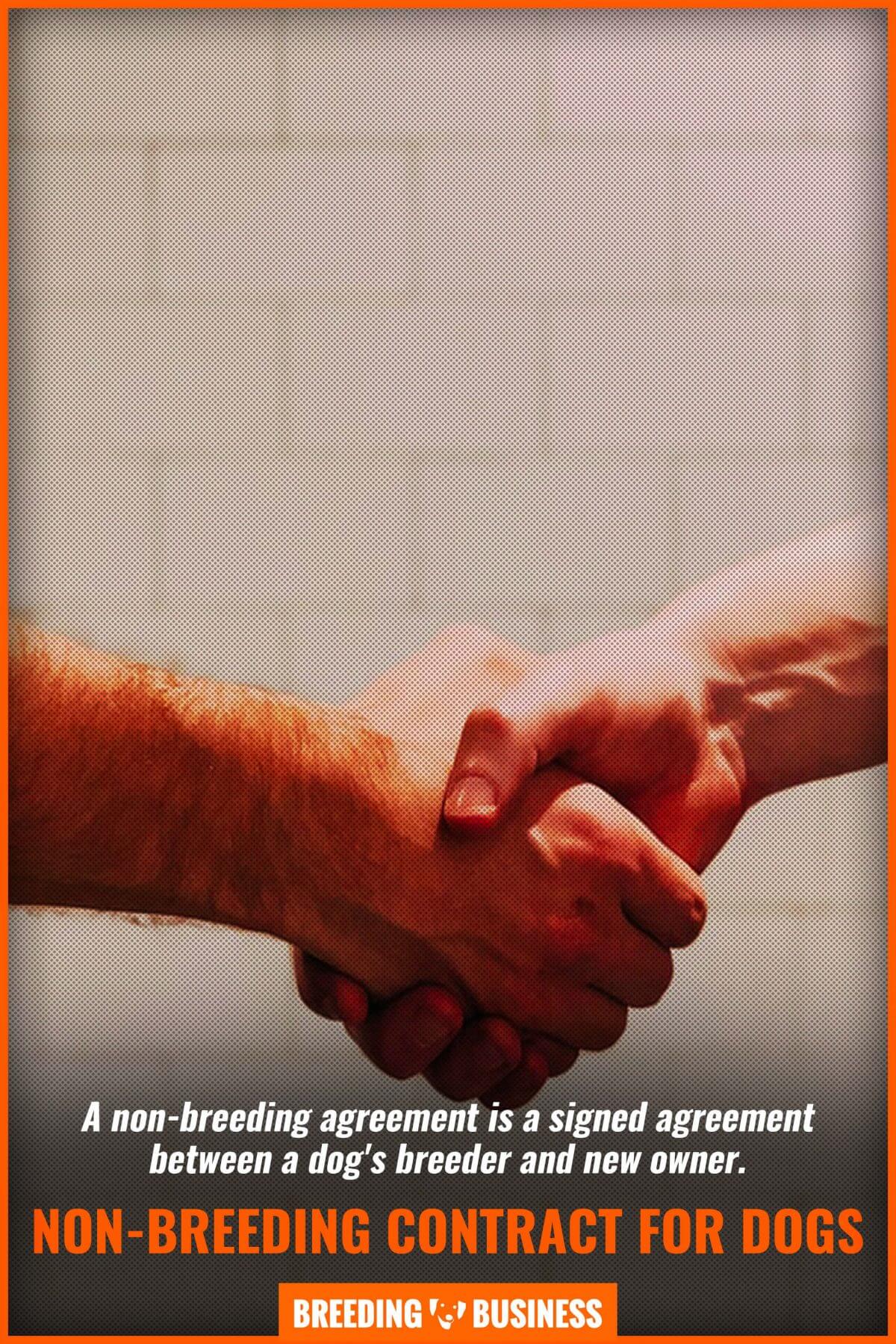
Home » Dogs » Are Dog Breeder Contracts Enforceable?
↯ Key takeaway points

Breeding Business is passionate about all sorts of domesticated pets. They have written dozens of articles across the web.

Gold medalist veterinary student from UVAS Lahore writes captivating articles and is passionate about animal care.
Published on Thursday 9 July 2020 Last updated on Monday 6 November 2023
This page may contain affiliate links. We may receive a commission if you make a purchase using these links.
Dog breeder contracts are created between buyers and breeders to ensure that a financial agreement has been put in place. It also covers concerns such as ethics and return policy. Many buyers and breeders debate on how legally binding these contracts are if at all.
But are dog breeder contracts enforceable? And if so, to what extent and how do you do so? We are going to explore the legal aspects of dog breeder contracts and discover how enforceable each section is. Furthermore, if you are curious about creating enforceable dog breeder contracts, we will explain how to achieve this goal.
Please note, this article is purely informative. Do not act or refrain from acting upon this information without seeking professional legal advice: you are strongly advised to obtain specific, personal legal advice about your case or matter and not to rely on the information or comments on this website.
A general summary of what a dog breeder contract is is a contract to enforce the proper care by new buyer. It also states the welfare gone into their breeding and treatment by the breeder. This is to ensure high standards of care from their genetics to the breeder’s care of the puppy whilst in ownership. Furthermore, it can display that both the breeder and the new buyer are aware of the pup’s genetics, health problems, pet or show quality, and even their lineage. Signing a document to display both parties’ awareness of characteristics and abiding factors allow either the breeder or the buyer to use the contract as evidence of awareness of the agreement. Here is a list of the usual factors in a dog breeding contract:
Some of these points are mentioned to prove both the buyer and owner are aware of them. This would prevent, for example, an owner saying they agreed upon a lower purchasing price. You can mention other points for protocol if necessary. Such as if the buyer could return the pup and what reasons would this be allowed under.
Any breeder and buyer can enforce a dog breeding contract as long as it is reasonable. Micromanaging of the buyer’s care by the breeder alongside unreasonable demands are often what deems a contract unreasonable. Unreasonable demands may consist of weekly pictures of the pup growing up permanently. Not only is this time-consuming but can be frustrating as well, forgetting a single week may be quite stressful. Furthermore, this requirement is just generally unreasonable. A breeder does not need weekly pictures for the buyer to provide and display good care of the pup.
Micromanaging of the buyer by the breeder can lead to the new owner making no decisions on the care of their dogs. This micromanaging can dictate food brands, portions, training schedules, and even walking timetables. One of the best parts of owning a dog is enforcing good care and deciding what is best for your pup. If these terms are deemed eligible in a contract then this would take away some of the joys of owning a dog. Furthermore, no dog can receive their ideal care from a contract that cannot be altered. Their diet and walking schedule may need changing due to their health and preferences alone. Therefore, a contract cannot be deemed eligible if they are unreasonable like this.

If you are a dog breeder and want to make sure your contract can be enforced, check out these rules to follow so there are no loopholes for a buyer to find.
Micromanaging an owner’s treatment of their dog can lead a contract you cannot enforce. This is not to say that dictating the standard of care you want for your dog. Such as detailing that they require love, vet visits, and a good diet. However, if you are telling the owner the mandatory brand of dog food they must provide and what schedule they should provide for walking their dog, this can prevent a contract from being enforceable.
The more unreasonable a request is with a high level of difficulty in application, the less likely you can enforce it. If one day the owner could not find the demanded brand of dog food, this would be in breach of the contract from no fault of their own. Allow the dog’s owner to make the best choices for their individual. To prevent the need for micromanaging, ensure you are only selling your dogs to an owner you trust and one that has good knowledge of dog care.
If you are worrying about the future care of the dogs you are selling, instead of setting strict requirements for the owners, consider recommendations. Strict requirements prevent an owner from altering the care for their dog to tailor their individual needs. However, providing care recommendations creates a more reasonable and enforceable contract, alongside providing the new owner with a source of knowledge and care that can help them treat their dog correctly.
These recommendations do not need to be within the contract and instead can give a separate care sheet to the new owner. This care sheet can include everything from advised training schedules to recommended food plans. Furthermore, each breed type has specific care requirements, such as the Komondor’s fur care. This will allow you to create a tailored advisory document to make sure that all of your sold pups’ owners to have access to the information you deem is best for each dog’s care.
You can consider offering incentives for each owner following your documented list of requirements. For example, perhaps you recommend a training timetable to allow the pup to be at a certain behavioral level at different age stages. At a year of age, the owner could display, either by video or an in-person visit, all the training the pup has learned. If their training and general behavioral level are up to the desired standard, you could offer to return 10% of their initial buying price.
Incentives do not have to be financial, some breeders offer discounts on a future puppy purchase or even offer training classes. Regardless of the incentive, they are a powerful tool to use. It can encourage owners to follow your recommendations without you needing to include these in the contract. Furthermore, you can use these incentives at any time scale, such as at one year of age or five, to continue high standards of care.
An alternate solution to enforcing recommendations is applying penalties to owners who do not follow them. You can use penalties alongside incentives or as stand-alone procedures. For example, we will refer to our earlier example of training incentives. Instead of being paid 10% of the dog’s initial cost, if the training has not been implemented a penalty may require an extra 10% of payment from the original buying price.
You can also just use stand-alone penalties. For example, a dog that has demonstrated dog aggressive behavior without any evidence by the owner of combating this, a breeder may prevent the owner from purchasing another dog from them. This is because evidence of doubt of proper dog socialization can display a general lack of effort in dog care. This is of course not always the case, but if you are a breeder that displays a thorough socialization document and have heard no contact from the new owner, this may be evidence of a lack of trying.
Here are a few general tips that you can use to create enforceable dog breeder contracts.
When a new owner sees their future best friend, they may immediately fall in love with them. This can lead to them disregarding some elements of the contract and convincing themselves that they can adhere to it due to their strong want to own the puppy. Try to remove the possibility of this situation entirely. Show and discuss the contract on arrival and once the two of you have had a thorough discussion with the owner confirming they can adhere to the rules, then allow them to meet the pups.
Make sure to tell the visiting owner that a discussion of the contract will begin before they are allowed to meet the puppy due to you wanting to make sure they can enforce high standards of care. Any good owner will understand this, and if they seem reluctant, it may be worth walking away.
If at any point in the adoption process a potential owner is reluctant to sign the contract, it is often recommended to not sell them a puppy for multiple reasons. Firstly, if the elements you have put in place are all for the care of your dogs, why would they have an issue with this? You want to sell your dogs to those who want to give the pups a high standard of care, therefore, them signing a contract should only increase their level of comfort as well. As they would know they are buying from a reputable breeder and one who cares about dogs as much as they do.
Furthermore, If an owner already begins to disagree or show hostility from the introduction of a contract, then they may be difficult to communicate with throughout the adoption process and during their ownership of the dog. This can be unpleasant for you and may reinforce your doubts about their care towards your pups.

By setting a review date for the contract, you are able to evaluate how much has been enforced. This is useful because once these agreement dates are set, you know that you can evaluate how much of the contract has been followed. Furthermore, if the owner is struggling to follow certain criteria, such as a training routine, you can give advice and help them achieve the standard required.
Alongside this, regular check-ups can help you see if the owner has been following all the agreed criteria. If you find evidence that they have not, then this can help you decide how to proceed and in what extremes. A general failed review date may also show that an owner if not following the contract generally and you can then consider contacting someone about the failed contract.
The carrot and stick method can be used to encourage an owner to follow a dog breeder contract. The carrot represents an incentive for owners correctly following the contract whereas the stick represents penalties for areas of the contract they have not followed.
This method is often a brilliant way of enforcing a dog breeder contract as it appeals to potential owners. They want to achieve the incentive and avoid the penalty, therefore they will follow the criteria of the provided contract.
To make sure that all your dog breeder questions have been answered, we have compiled four of the most frequently asked questions and answered them here.
A breeder can repossess a dog as long as both the owner and breeder agree and sign an enforceable dog breeder contract. There are a few things you need to be aware of though. If a dog breeder contract has difficult criteria or unreasonable requests, it is not enforceable. Furthermore, if you do not have evidence of both you and the owner signing the contract, then again, it is not enforceable. If an owner is in breach of contract, contact the authorities to enforce a dog repossession. Also note that breeders do have the right to take a dog back if the owner is struggling.
Anyone can breed a dog without breeding rights, but in order to do so legally, you need breeding rights. These can be defined as registration and the right to possess and record a dog in kennel clubs.
Puppy contracts are documents that detail all about a puppy. It should prove that they have been well-bred and cared for. It also helps to prove to the buyer that you are not a backyard breeder. A puppy contract usually includes their lineage, pedigree, health, inoculations, and other registration and personal details. Each puppy should have a puppy contract to display that it is registered to a kennel club. This should be displayed alongside evidence of it being bred properly.
A non-breeding agreement is a signed agreement between a dog’s breeder and new owner. It states that the owner will not breed from this dog. Breeders may want a buyer to sign a non-breeding contract for health reasons. These may include the dog showing evidence of hereditary diseases, therefore it would be unethical to breed from them. This displays a breeder that cares about the welfare of their dogs and is a positive sign. A non-breeding contract may also be used if a dog is of pet-quality and not show quality. Or as a financial benefit towards themselves.

Dog breeder contracts require a lot of thought when drafting by the breeder. They also require a lot of consideration before being signed by the buyer. These contracts can help to wean out unethical breeders and buyers. They also allow for a genetically healthy dog to go to the right owner.
Table of Contents